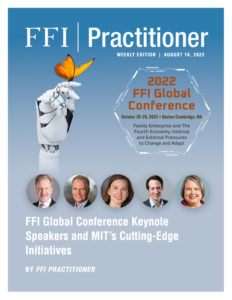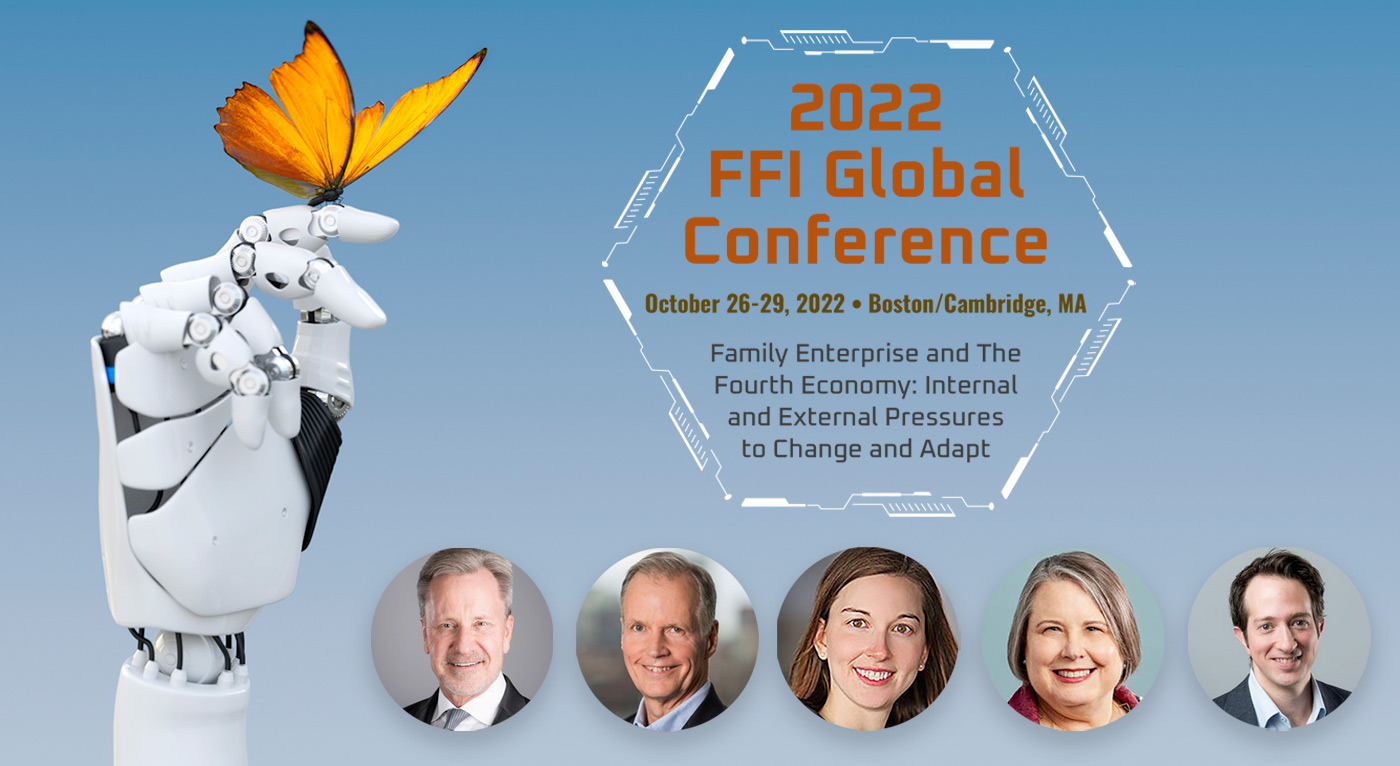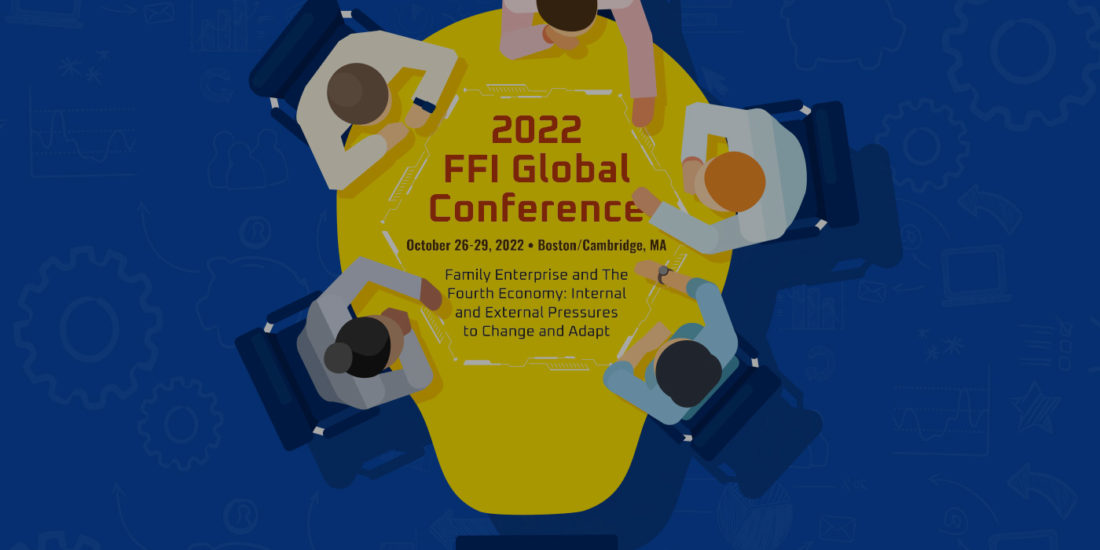
View this edition in our enhanced digital edition format with supporting visual insight and information.
This week’s FFI Practitioner features the five distinguished keynote presenters headlining the October FFI global conference, presented in collaboration with academic host MIT Sloan School of Management. Learn more about these keynotes from the MIT faculty and the MIT research centers and initiatives developing cutting-edge thinking on topics relevant to the family enterprise field.
For more than 35 years, FFI has pursued its mission to be the most influential global network of thought leaders in the field of family enterprise, providing research-based learning and relevant tools for advisors and consultants, academics, and family enterprise members. And for nearly 20 years, FFI Practitioner has provided thought-provoking analysis, trends, and research affecting those in the family enterprise field.
This year we have a unique opportunity for the field, with MIT Sloan School of Management as the academic host for FFI’s global conference in October. Five distinguished faculty members from MIT Sloan School of Management will be on the agenda as keynote presenters. This is a once-in-a-lifetime experience for professionals and academics in the field—we hope many of you will join us.
However, if you cannot attend this year’s conference in Kendall Square in Cambridge, this issue of FFI Practitioner will acquaint you with five MIT research centers and initiatives that provide the latest thinking on topics relevant to the family enterprise field.
In a world that is rapidly changing and often confusing, the speakers and centers provide clarity, grounding, research, and much more for everyone.
2022 FFI Global Conference Keynotes from MIT

John Davis
FFI Founder and 2022 Conference Program Chair
Senior Lecturer in Family Enterprise Executive Programs at MIT Sloan
Keynote Topic: Changing Family Dynamics
John A. Davis is a Senior Lecturer in the Family Enterprise Executive Programs at the MIT Sloan School of Management. He is a globally recognized pioneer and authority on issues related to the family enterprise, family wealth, and the family office, as well as the creator of some of the field’s most impactful conceptual frameworks. He is founder and chairman of the Cambridge Family Enterprise Group, a global organization he created in 1989 that is devoted to helping enterprising families achieve long-term and lasting success for their families, enterprises, and financial wealth.
An early founder of the family business field as an academic discipline, John has written significant works explaining family enterprise dynamics and success. In 1978, with Harvard Business School Professor Renato Tagiuri, he co-created the Three-Circle Model of the Family Business System, the fundamental paradigm in the family business field. He developed the Family Enterprise framework to help families map their collection of meaningful activities and assets that unite and define them, and the Family Enterprise Sustainability framework, which distills the three essential ingredients needed for the successful longevity of a family enterprise.
More about MIT’s Family Enterprise Executive Programs
Disruption and change are shortening time horizons for all businesses, but family businesses have extra layers of complexity—the future success of the business is inseparable from the well-being of the family—and all the more reason to be better educated about the future.

Jason Jay
Director of the Sustainability Initiative of MIT Sloan
Keynote Topic: Environmental Sustainability
Jason Jay is a Senior Lecturer at the MIT Sloan School of Management where he teaches courses on leadership, strategy, and innovation for sustainable business. Jason engages students and alumni in hands-on projects with leading companies and organizations. These efforts help build a community of innovators for sustainability that includes MIT students and alumni, faculty and researchers, with partners in business, government, NGOs, and hybrid organizations.
Jason’s research focuses on how people navigate the tensions inherent in the quest for sustainability, as they simultaneously pursue their own self-interest and the flourishing of human and other life. A key finding of his research is that social innovation occurs through authentic conversations that hold the tension between divergent values and perspectives.
More about the MIT Sloan Sustainability Initiative
The mission of the Sustainability Initiative is to provide the best education, apply academic rigor to real world problems, and empower leaders everywhere to act, professionally and personally, so that humans and nature can thrive for generations to come.
We do this through the joint efforts of MIT students, faculty, alumni, researchers, and partners in business, government, NGOs, and hybrid organizations.
If you are ready to make an impact and can envision a day when both humans and nature can thrive, we hope you will join our community.
Let’s make our vision of a just and equitable future a reality in our lifetimes.

Thomas Malone
Director of the MIT Center for Collective Intelligence
Keynote Topic: Future of Work
Thomas W. Malone is the Patrick J. McGovern (1959) Professor of Management at the MIT Sloan School of Management and the founding director of the MIT Center for Collective Intelligence. At MIT, he is also a Professor of Information Technology and a Professor of Work and Organizational Studies. He teaches classes on organizational design, information technology, and leadership, and his research focuses on how new organizations can be designed to take advantage of the possibilities provided by information technology.
Malone predicted in an article published in 1987 many of the major developments in electronic business over the following 25 years, including electronic buying and selling for many kinds of products. Malone has been a cofounder of four software companies and has consulted and served as a board member for a number of other organizations. He is also an inventor with 11 patents.
More about the Center for Collective Intelligence
CCI’s mission is to understand collective intelligence at a deep level to be able to take advantage of the new possibilities it presents. Another way of saying this: we seek to learn about the workings of superminds so we and the world can build new kinds of superminds in the future.
These aspirations are embodied in the animating question behind CCI’s work: How can people and computers be connected so that—collectively—they act more intelligently than any person, group, or computer has ever done before? Our hope is that CCI’s work will lead both to new scientific understanding in a variety of disciplines and to practical advances in many areas of business and society.

Julie Shah
Director of the Interactive Robotics Group
Keynote Topic: Future of Work
Julie Shah is an Associate Professor in the Department of Aeronautics and Astronautics at MIT and leads the Interactive Robotics Group of the Computer Science and Artificial Intelligence Laboratory. She has developed innovative methods for enabling fluid human-robot teamwork in time-critical, safety-critical domains, ranging from manufacturing to surgery to space exploration. Her group draws on expertise in artificial intelligence, human factors, and systems engineering to develop interactive robots that emulate the qualities of effective human team members to improve the efficiency of human-robot teamwork.
In 2014, Shah was recognized with an NSF CAREER award for her work on “Human-aware Autonomy for Team-oriented Environments,” and by the MIT Technology Review TR35 list as one of the world’s top innovators under the age of 35. She has received international recognition in the form of best paper awards and nominations from the International Conference on Automated Planning and Scheduling, the American Institute of Aeronautics and Astronautics, the IEEE/ACM International Conference on Human-Robot Interaction, the International Symposium on Robotics, and the Human Factors and Ergonomics Society.
More about the Interactive Robotics Group (IRG)
In everyday settings, from factories to hospitals, it is increasingly common to see robots working alongside people. But because robots lack the intelligence to accommodate their more dynamic human partners, robots and humans work independently. In nearly every industry, the “either/or” tasking of people and robots results in massive inefficiency in producing goods and services.
We enhance human capability by designing machine intelligence that enables robots to work alongside humans as highly effective teammates. Our vision is to harness the relative strengths of humans and robots to accomplish what neither can do alone.

Stephanie Woerner
Principal Research Scientist at the Center for Information Systems Research
Keynote Topic: Societal Trends
Stephanie Woerner is a Principal Research Scientist at the MIT Sloan Center for Information Systems Research. She studies how companies manage organizational change caused by the digitization of the economy. Her research centers on enterprise digitization and the associated governance and strategy implications. Three current studies include: i.) the amount, allocation, and impact of enterprise-wide digital investments, ii.) how digitization is influencing the next-generation enterprise, and iii.) the impact of the Internet of Things on company business models and the competitive landscape. In previous National Science Foundation-funded work, she studied distributed work teams and their use of multiple media, electronic communication technologies, and coordination mechanisms to get work done; she was also project manager for the 5-year grant.
More about the Center of Information Systems Research
This broad research theme covered activities across all aspects of systems that process information, and the underlying science and mathematics, and includes communications, networking & information theory; numerical and computational simulation and prototyping; signal processing and inference; medical imaging; data science, statistics and inference.

View this edition in our enhanced digital edition format with supporting visual insight and information.





